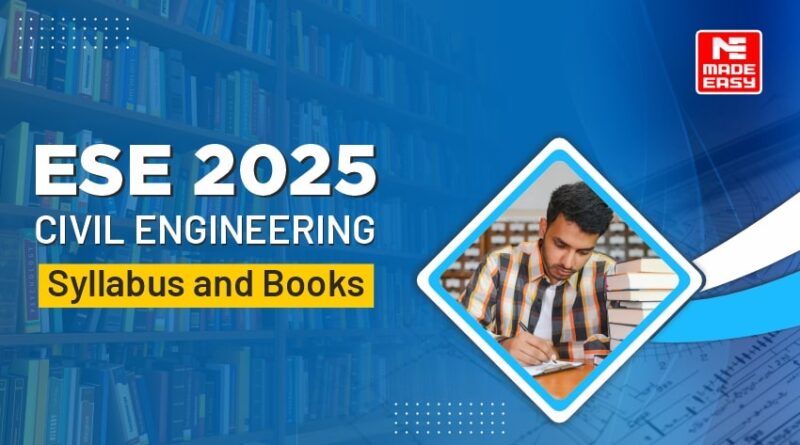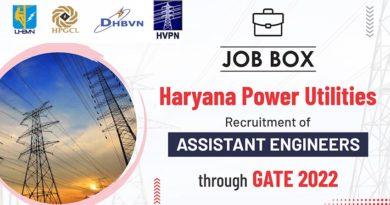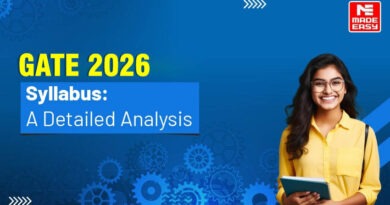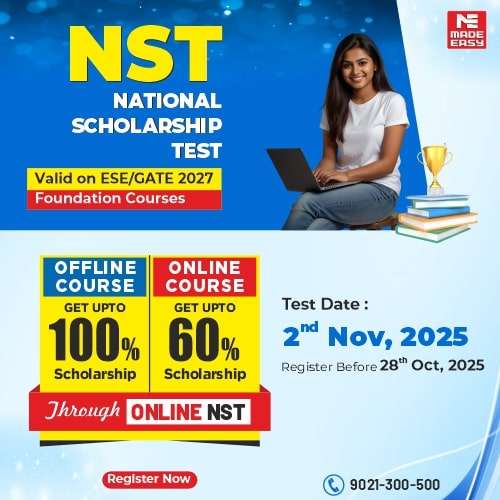ESE 2025 Civil Engineering Syllabus and Books
UPSC ESE Exam 2025 Civil Engineering Syllabus
The Engineering Services Examination, also known as ESE, is one of the most important examinations conducted by the UPSC (Union Public Service Commission). Each year, thousands of aspirants appear for this exam and try to accomplish their dream of securing a reputed government job. To ensure that you have a smooth preparation journey, it is mandatory to know about the syllabus of the exam. It helps to draft your preparation plan.
Today, we will be discussing the detailed syllabus of the ESE syllabus for the Civil Engineering stream to help the students become acquainted with the examination syllabus. Now, before diving into the detailed ESE Syllabus for Civil Engineering, let us learn some critical aspects associated with the UPSC ESE 2025.
👉🏻 Summer Sale: Flat 35% Off on All MADE EASY BOOKS
What is ESE Civil Engineering?
ESE Civil Engineering is an Engineering Services Examination for candidates with a Civil Engineering background. Civil engineering is one of the top engineering streams and is a crucial part of the ESE, earlier called Indian Engineering Services.
What is the ESE Civil Engineering Syllabus 2025?
ESE Syllabus Preliminary Stage I Examination: Civil Engineering (CE)
The standard of paper in General Studies and Engineering Aptitude (Preliminary Stage I Examination) will be such as may be expected of an engineering or science graduate. The standard of papers in other subjects will approximate that of an engineering degree examination at an Indian University. There will be no practical examination in any of the subjects. General Studies and Engineering Aptitude (Preliminary Examination/Stage I, Paper I, Objective Type, Common to all candidates)
- Current issues of national and international importance, relating to social, economic, and industrial development.
- Engineering aptitude covers logical reasoning and analytical ability.
- Engineering Mathematics and Numerical Analysis.
- General Principles of Design, Drawing, and Safety.
- Standards and quality practices in production, construction, maintenance, and services
- Basics of Energy and Environment: Conservation, Environmental Pollution and Degradation, Climate Change, and Environmental Impact Assessment.
- Basics of Project Management.
- Basics of Material Science and Engineering.
- Information and Communication Technologies (ICT)-based tools and their applications in Engineering such as Networking, E-Governance, and technology-based education.
- Ethics and values in the engineering profession.
Note: The paper in General Studies and Engineering Aptitude will test the knowledge of relevant topics, as may be expected from an engineering graduate without special study. Questions from all 10 topics mentioned will be included in the exam paper. The set marks for each topic may range from 5% to 15% of the total marks in the paper.
The ESE 2025 Exam Syllabus for Civil Engineering is divided in two segments. This includes the preliminary examination (Stage I) and the main/Stage II examination.
Note: The preliminary examination includes objective Paper II, and the main examination mainly includes conventional type Paper I and Paper II.
Let us check out the most significant aspect of this blog post, i.e., the ESE Syllabus for Civil Engineering.
ESE Main 2025 Syllabus Civil Engineering (PAPER – I)
- Building Materials: Stone, Lime, Glass, Plastics, Steel, FRP, Ceramics, Aluminum, Fly Ash, Basic Admixtures, Timber, Bricks and Aggregates: Classification, Properties and Selection Criteria; Cement: Types, Composition, Properties, Uses, specifications, and various Tests; Lime & Cement Mortars and Concrete: Properties and various Tests; Design of Concrete Mixes: Proportioning of Aggregates and Methods of Mix Design.
- Solid Mechanics: Elastic constants, Stress, plane stress, Strains, plane strain, Mohr’s circle of stress and strain, Elastic theories of failure, Principal Stresses, Bending, Shear, and Torsion.
- Structural analysis: Basics of strength of materials, Types of stresses and strains, Bending moments and shear force, concept of bending and shear stresses; Analysis of determinate and indeterminate structures; Trusses, beams, and plane frames; Rolling loads, Influence Lines, Unit load method & other methods; Free and Forced vibrations of single degree and multi-degree freedom system; Suspended Cables; Concepts and use of Computer Aided Design.
- Design of steel structures: Principles of Working Stress methods, Design of tension and compression members, Design of beams and beam column connections, built-up sections, Girders, Industrial roofs, Principles of Ultimate load design.
- Design of Concrete and Masonry structures: Limit state design for bending, shear, axial compression, and combined forces; Design of beams, Slabs, Lintels, Foundations, Retaining walls, Tanks, and Staircases; Principles of pre-stressed concrete design including materials and methods; Earthquake resistant design of structures; Design of Masonry Structure.
- Construction Practice, Planning, and Management: Construction – Planning, Equipment, Site investigation, and Management including Estimation with the latest project management tools and network analysis for different Types of works; Analysis of Rates of various types of works; Tendering Process and Contract Management, Quality Control, Productivity, Operation Cost; Land Acquisition, and Labour Safety and Welfare.
ESE Main Syllabus Civil Engineering (PAPER – II)
1. Flow of Fluids, Hydraulic Machines, and Hydro Power:
(a) Fluid Mechanics, Open Channel Flow, Pipe Flow: Fluid properties; Dimensional Analysis and Modeling; Fluid dynamics including flow kinematics and measurements; Flow net; Viscosity, Boundary layer and control, Drag, Lift, Principles in open channel flow, Flow controls. Hydraulic jump; Surges; Pipe networks.
(b) Hydraulic Machines and Hydro power: Various pumps, Air vessels, Hydraulic turbines – types, classifications & performance parameters; Power house – classification and layout, storage, pondage, control of supply.
2. Hydrology and Water Resources Engineering:
Hydrological cycle, Ground water hydrology, Well hydrology and related data analysis; Streams and their gauging; River morphology; Flood, drought and their management; Capacity of Reservoirs.
Water Resources Engineering: Multipurpose uses of Water, River basins and their potential; Irrigation systems, water demand assessment; Resources – storages and their yields; Water logging, canal and drainage design, Gravity dams, falls, weirs, Energy dissipaters, barrage Distribution works, Cross drainage works and head-works and their design; Concepts in canal design, construction & maintenance; River training, measurement and analysis of rainfall.
3. Environmental Engineering:
(a) Water Supply Engineering: Sources, Estimation, quality standards and testing of water and their treatment; Rural, Institutional and industrial water supply; Physical, chemical and biological characteristics and sources of water, Pollutants in water and its effects, Estimation of water demand; Drinking water Standards, Water Treatment Plants, Water distribution networks.
(b) Waste Water Engineering: Planning & design of domestic waste water, sewage collection and disposal; Plumbing Systems. Components and layout of sewerage system; Planning & design of Domestic Waste water disposal system; Sludge management including treatment, disposal and re-use of treated effluents; Industrial waste waters and Effluent Treatment Plants including institutional and industrial sewage management.
(c) Solid Waste Management: Sources & classification of solid wastes along with planning & design of its management system; Disposal system, Beneficial aspects of wastes and Utilization by Civil Engineers.
(d) Air, Noise pollution and Ecology: Concepts & general methodology.
4. Geo‐technical Engineering and Foundation Engineering:
(a) Geo-technical Engineering: Soil exploration – planning & methods, Properties of soil, classification, various tests and inter-relationships; Permeability & Seepage, Compressibility, consolidation and Shearing resistance, Earth pressure theories and stress distribution in soil; Properties and uses of geo-synthetics.
(b) Foundation Engineering: Types of foundations & selection criteria, bearing capacity, settlement analysis, design and testing of shallow & deep foundations; Slope stability analysis, Earthen embankments, Dams and Earth retaining structures: types, analysis and design, Principles of ground modifications.
5. Surveying and Geology:
(a) Surveying: Classification of surveys, various methodologies, instruments & analysis of measurement of distances, elevation and directions; Field astronomy, Global Positioning System; Map preparation; Photogrammetry; Remote sensing concepts; Survey Layout for culverts, canals, bridges, road/railway alignment and buildings, Setting out of Curves.
(b) Geology: Basic knowledge of Engineering geology & its application in projects.
6. Transportation Engineering:
- Highways: Planning & construction methodology, Alignment and geometric design; Traffic Surveys and Controls; Principles of Flexible and Rigid pavements design
- Tunneling: Alignment, methods of construction, disposal of muck, drainage, lighting and ventilation
- Railway Systems: Terminology, Planning, designs and maintenance practices; track modernization
- Harbours: Terminology, layouts and planning
- Airports: Layout, planning & design
Therefore, this is detailed information about the ESE Syllabus for Civil Engineering, which will help you streamline your preparation by making you aware of the syllabus. Now that we know about the detailed syllabus associated with the UPSC ESE 2025 Syllabus, specifically for the ESE syllabus for Civil Engineering, let us know about the ESE Civil Engineering books including MADE EASY ESE Prelims books.
👉🏻 ESE 2025 Exam Books for Civil Engineering:
Choosing the best Civil Engineering Books for exam preparation is a critical step associated with the ESE preparation strategy. Some Civil Engineering books for ESE are listed below:
| S. No. | Subject | Book Name | Author |
|---|---|---|---|
| 1 | Strength of Materials | MADE EASY THEORY BOOK: SOM Previous Year Solved Paper | MADE EASY PUBLICATIONS |
| MADE EASY THEORY BOOK: SOM Through Ques. & Ans. MADE EASY PUBLICATION | Dr. U. C. Jindal | ||
| A textbook on the Strength of Materials | Dr. U. C. Jindal | ||
| Mechanics of Materials | Gere & Timoshenko | ||
| Strength of Materials for transformation of stresses, Properties of Metals | E. Popov | ||
| Strength of Materials for unsolved problems | L. Singer | ||
| Strength of Materials for Solved problems, Theory of average reading | B.C. Punamia | ||
| Mechanics of Structure (vol. 1) | Dr. H.J. Shah, S.B. Junnarkar | ||
| 2 | Theory of Structures/Analysis of Structure | MADE EASY THEORY BOOK: STRUCTURE ANALYSIS | MADE EASY PUBLICATIONS |
| Theory of Structures/Analysis of Structure | S Ramamrutham | ||
| Theory of Structures/Analysis of Structure | L.S. Negi & Jangid | ||
| Theory of Structures/Analysis of Structure | Gupta & Pandit, C S Reddy | ||
| Structural Analysis (9th Edition) | R. C. Hibbeler | ||
| Analysis of Structures (vol. I & II) | Vazirani & Ratwani | ||
| Structural Dynamics | Mario Paz | ||
| 3 | RCC Design | MADE EASY THEORY BOOK: RCC | MADE EASY PUBLICATIONS |
| RCC Design | B. C. Punamia, | ||
| N Krishanrajan | |||
| RCC. Design | A. K. Jain | ||
| S N Sinha | |||
| RCC. Design | IS: 456-2000 | ||
| Reinforced Concrete Design | Pillai & D. Menon | ||
| Prestressed Concrete (2nd Edition) | N. Krishna Raju | ||
| 4 | Steel Design | MADE EASY THEORY BOOK: Steel Design | MADE EASY PUBLICATIONS |
| Limit State Design of Steel Structures (2nd Edition) | S.K. Duggal | ||
| Steel Design | L. S. Negi | ||
| Steel Design | IS: 800-1984 | ||
| Bhavi Katti | |||
| Design of Steel Structures | N. Subramaniam (Oxford Publication) | ||
| 5 | Environmental Engineering | MADE EASY THEORY BOOK: Environment Engineering | MADE EASY PUBLICATIONS |
| Environmental Engineering (vol. I & II) | S. K Garg | ||
| Environmental Engineering (vol. I & II) | B. C. Punamia | ||
| Environmental Engineering | Peavy & Rowe | ||
| Environmental Engineering | Metcalf & Eddy | ||
| Wastewater Treatment for Pollution Control | Soli J Arceivala | ||
| 6 | Soil Mechanics & Foundation Engineering | MADE EASY THEORY BOOK: Soil Mechanics & Foundation | MADE EASY PUBLICATIONS |
| Basic and Applied Soil Mechanics | Gopal Ranjan & Rao | ||
| Soil Mechanics & Foundation Engg. | Venkat Ramaiha | ||
| Soil Mechanics & Foundation Engg. | S. K. Garg | ||
| Soil Mechanics & Foundation Engg. | B. C. Punamia | ||
| Soil Mechanics & Foundation Engineering | Dr. K. R. Arora | ||
| Soil Mechanics & Foundations | Muni Budhu | ||
| Soil Mechanics | R. F. Craig | ||
| 7 | Fluid Mechanics & Fluid Machines | MADE EASY THEORY BOOK: Fluid Mechanics & Fluid Machines | MADE EASY PUBLICATIONS |
| Hydraulics and Fluid Mechanics including Hydraulic Machines | Modi & Seth | ||
| Fluid Mechanics & Hydraulic Machines (9th Edition) | R. K. Bansal | ||
| Flow in Open Channel | K. Subramanya | ||
| Fluid Mechanics & Fluid Machines | A. K. Jain | ||
| Hydraulic Machines | Jagdish Lal | ||
| Fluid Mechanics & Fluid Machines | K. Subramanya | ||
| 8 | Highway Engineering | MADE EASY THEORY BOOK: Highway Engg. | MADE EASY PUBLICATIONS |
| Highway Engineering | Khanna & Justo | ||
| Highway Engineering | L R Kadiyali | ||
| Highway Engineering | S. K. Sharma | ||
| 9 | Surveying | MADE EASY THEORY BOOK: Surveying | MADE EASY PUBLICATIONS |
| Surveying (vol. I & II) | B.C. Punamia | ||
| Surveying (vol. I & II) | S.K. Duggal | ||
| 10 | Engineering Hydrology | MADE EASY THEORY BOOK: Hydrology | MADE EASY PUBLICATIONS |
| Hydrology | K. Subramanya | ||
| 11 | Irrigation Engineering | MADE EASY THEORY BOOK: Irrigation Engineering | MADE EASY PUBLICATIONS |
| Irrigation Engineering and Hydraulic Structures | S.K. Garg | ||
| Irrigation Water Resources and Water Power Engineering | P. N. Modi | ||
| 12 | Construction Engineering | Construction Engineering and Management | Dr. S. Seetharaman |
| Construction Project Management | K. N. Jha | ||
| Construction Project Management | K. K. Chitkara | ||
| 13 | Building Materials | Engineering Materials | Rangwala |
| Building Materials | S.K. Duggal | ||
| Concrete Technology | M. S. Shetty | ||
| Building Construction | Susheel Kumar | ||
| Concrete Technology | M. L. Gambhir | ||
| 14 | Railway Engineering | Railway Engineering | S.C. Saxena & S.P. Arora |
| 15 | Airport Engineering | Airport Planning & Design | S. K. Khanna & M. G. Arora |
| 16 | Harbour, Dock, and Tunnel Engineering | Harbour, Dock, and Tunnel Engineering | R. Srinivasan |
| 17. | Other References | GATE 2025: Civil Engg. Solved Papers | MADE EASY PUBLICATIONS |
| A Handbook of Civil Engineering | MADE EASY PUBLICATIONS |
The above books are very useful in preparing for ESE 2025 Civil Engineering. If you would like to purchase them, click on the link below.
MADE EASY ESE CIVIL ENGINEERING BOOKS
You can refer to the ESE Prelim Exam Solved Papers and ESE Main Exam Solved Papers published by MADE EASY Publications with standard books to increase your chances of securing the required results in the exam. Therefore, choose the right Engineering Books for ESE 2025 Civil Engineering and see yourself excelling in the exam preparation journey.
What are some of the recommended books to cover the ESE Civil Engineering syllabus 2025?
To get a glimpse of the type, level, and pattern of questions, go through the solved question paper of previous years of the ESE below:
- ESE 2025: Preliminary Exam: Civil Engineering Objective Solved Paper Vol-1
- ESE 2025: Preliminary Exam: Civil Engineering Objective Solved Paper Vol-2
- Engineering Mathematics for GATE and ESE-2025
- Reasoning and Aptitude for GATE and ESE- 2025
- ESE 2025: Information and Communication Technologies
Hope this blog post provided you with clarity regarding the ESE 2025 Exam Syllabus for Civil Engineering.
Good luck with your ESE Civil Engineering Exam preparation!
Dear Aspirants,
Your preparation for GATE, ESE, PSUs, and AE/JE is now smarter than ever — thanks to the MADE EASY YouTube channel.
This is not just a channel, but a complete strategy for success, where you get toppers strategies, PYQ–GTQ discussions, current affairs updates, and important job-related information, all delivered by the country’s best teachers and industry experts.
If you also want to stay one step ahead in the race to success, subscribe to MADE EASY on YouTube and stay connected with us on social media.
MADE EASY — where preparation happens with confidence.

MADE EASY is a well-organized institute, complete in all aspects, and provides quality guidance for both written and personality tests. MADE EASY has produced top-ranked students in ESE, GATE, and various public sector exams. The publishing team regularly writes exam-related blogs based on conversations with the faculty, helping students prepare effectively for their exams.





